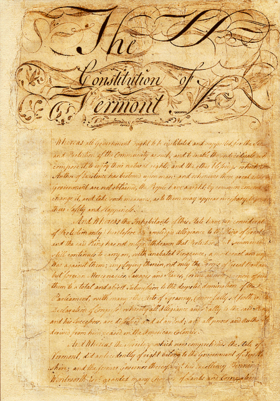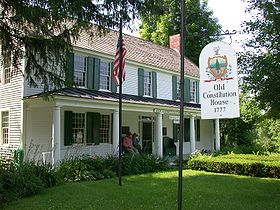- Constitution of Vermont (Vermont Republic)
-
The Constitution of Vermont was Vermont's constitution when it existed as the independent Vermont Republic or, more correctly, the Commonwealth of Vermont, from 1777 to 1791. The official title of the document was simply the Constitution of Vermont. The constitution was adopted in 1777 when Vermont declared independence from the British Empire. In 1791 Vermont became the fourteenth U.S. state and in 1793 it adopted its current constitution, the Constitution of the State of Vermont. The 1777 constitution was the first in what is now the territory of the United States to prohibit slavery, grant suffrages to non-landowning males, and require free public education.
The constitution was adopted on July 8, 1777, at the tavern in Windsor now known as the Old Constitution House and administered as a state historic site. The constitution consisted of three main parts. The first was a preamble reminiscent of the United States Declaration of Independence:
- It is absolutely necessary, for the welfare and safety of the inhabitants of this State, that it should be, henceforth, a free and independent State; and that a just, permanent, and proper form of government, should exist in it, derived from, and founded on, the authority of the people only, agreeable to the direction of the honorable American Congress.
(Here the term "American Congress" refers to the Continental Congress, not the United States Congress, which had not yet been established.)
The second part of the 1777 constitution was Chapter 1, a "Declaration of the Rights of the Inhabitants of the State of Vermont." This chapter was composed of 19 articles guaranteeing various civil and political rights in Vermont:
- The first article declared that "all men are born equally free and independent, and have certain natural, inherent and unalienable rights, amongst which are the enjoying and defending life and liberty; acquiring, possessing and protecting property, and pursuing and obtaining happiness and safety," echoing the famous phrases in the Declaration of Independence that declared that "all men are created equal" and possess "inalienable rights," including "life, liberty and the pursuit of happiness." The article went on to declare that because of these principles, "no male person, born in this country, or brought from over sea, ought to be holden by law, to serve any person, as a servant, slave or apprentice, after he arrives to the age of twenty-one Years, nor female, in like manner, after she arrives to the age of eighteen years, unless they are bound by their own consent." This effectively outlawed slavery and indentured servitude in Vermont.
- The second article declared that "private property ought to be subservient to public uses, when necessity requires it; nevertheless, whenever any particular man's property is taken for the use of the public, the owner ought to receive an equivalent in money." This established the basic principles of eminent domain in Vermont.
See also
External links
Categories:- 1777 in law
- 1793 in law
- Defunct state constitutions of the United States
- Pre-state history of Vermont
- Vermont culture
- Vermont law
- 1793 in the United States
Wikimedia Foundation. 2010.


